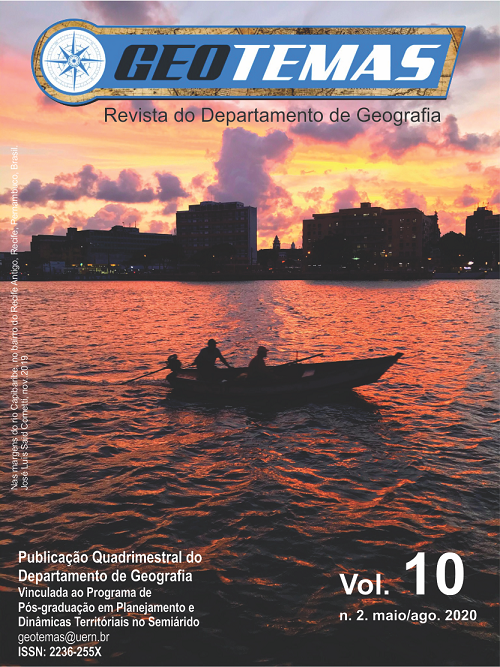A PERCEPÇÃO AMBIENTAL DOCENTE EM UMA ESCOLA PÚBLICA DO MUNICÍPIO DE UPANEMA-RN
Palavras-chave:
Gestão Ambiental, Educação Ambiental, SustentabilidadeResumo
Nos últimos séculos, especialmente após a Revolução Industrial, a relação homem natureza tem causado prejuízos aos ecossistemas planetários. Essa questão ambiental exige mudanças nos valores e no modo de vida produtiva da civilização humana atual. No entanto, a construção de uma mentalidade planetária ecológica poderá ocorrer mediante a implantação de uma educação ambiental, que dissemine novos valores e contribua para superação das percepções ambientais destrutivas que predominam entre os atores sociais no mundo contemporâneo. Por isso, o objetivo do presente artigo é identificar e analisar as percepções ambientais dos docentes de uma escola pública de ensino fundamental do município de Upanema-RN. Para isso, foi aplicado um questionário com quatro docentes desse estabelecimento de ensino,sendo analisadas as respostas com base nos referenciais teórico-metodológicos da educação ambiental crítica. Diante disso,identificamos que entre os docentes predominam conceitos e valores sobre a temática ambiental que está voltada para uma concepção de meio ambiente bastante reducionista e disciplinar. Essa limitação resulta na realização de práticas de educação ambiental de correntes conservadoras, que dissimulam as relações de dominação homem e natureza, e contribuem para perpetuação da sociedade de consumo e sua lógica destrutiva, que conduz a humanidade a uma grave catástrofe civilizatória desde o uso indevido dos recursos naturais, a forma de produção e os resíduos gerados.
Downloads
Referências
ARAUJO, S. de F. Wilhelm Wundt e a fundação do primeiro centro internacional de formação de psicólogos. Temas psicol., Ribeirão Preto, v. 17, n. 1, p. 09-14, 2009. Disponível em: < http://pepsic.bvsalud.org/scielo.php?script=sci_arttext&pid=S1413389X2009000100002>. Acesso em: 05 fev. 2018.
BARDIN, L. Análise de conteúdo. São Paulo: Edições 70, 2016.
BERNA, V. Como fazer educação ambiental. São Paulo: Paulus,2001.
BOFF, L. Sustentabilidade: O que é – o que não é. 4 ed. Petrópolis-RJ: Vozes, 2015.
BRASIL. MEC. Panorama da educação ambiental no ensino fundamental/Secretaria de Educação Fundamental, 2001. Disponível em: <http://portal.mec.gov/secad/arquivos/pdf/educacaoambiental/panorama.pdf>. Acesso em: 10 fev. 2018.
BRASIL. MEC. Parâmetros curriculares nacionais: meio ambiente: saúde/Secretaria da educação Fundamental. 3 ed. Brasília: A Secretaria,2001.
BRASIL. MEC. Ministério do Meio Ambiente. A implantação da educação ambiental no Brasil, 1998. Disponível em: <http://www.dominiopublico.gov.br/download/texto/me00164>. Acesso em: 12 fev. 2018.
CAMARGO, A. L. de B. Desenvolvimento sustentável: dimensões e desafios. 5 ed. Campinas/SP: Papirus, 2010.
CARVALHO, I. C. de M. Educação ambiental: a formação do sujeito ecológico. 6 ed. São Paulo: Cortez, 2017.
COSTA, L. M. Cultura e Natureza: Tribos urbanas e povos tradicionais. Rio de Janeiro: Garamond, 2011. (Col. Desafios do século XXI).
FAGGIONATO, S. Percepção Ambiental. Material e Textos. (2011). Disponível em: <http://educar.sc.usp.br/biologia/textos/m_a_txt4.html>. Acesso em: 04 jan. 2018.
FREIRE, P. Pedagogia do oprimido. 17 ed. Rio de Janeiro: Paz e Terra,1987.
GRUN, M. Ética e educação ambiental: A conexão necessária.12 ed. Campinas-SP: Papirus, 2015.
GUIMARíES, M. A formação de educadores ambientais. 8 ed. Campinas-SP: Papirus, 2014. (Coleção Papirus Educação).
HOEFFEL, J. L.; FADINI, A. A. B. Percepção ambiental. In: ENCONTROS e caminhos: formação de educadoras(es) e coletivos educadores. Brasília: Departamento de Educação Ambiental, 2007.
LAYRARGUES, P. P.; LIMA, G. F. C. As macrotendências político pedagógicas da educação ambiental brasileira. Ambiente & Sociedade, Campinas, v.17, n.1,p.23-40, 2014.Disponível em: <http://www.scielo.br/scielo.php?script=sci_arttext&pid=S1414753X2014000100003&lng=en&nrm=iso>. Acesso em: 10 jan. 2018.
LOUREIRO, C.F. Trajetórias e fundamentos da educação ambiental. São Paulo: Cortez, 2012.
MINAYO, M. C. de S. O desafio do conhecimento. São Paulo: Hucitec,1993.
REIGOTA, M. O que é educação ambiental. 3 edição. São Paulo: Brasiliense, 2014. (Coleção Primeiros Passos).
SAUVÉ, L. Uma cartografia das correntes em educação ambiental. In: SATO, M.; CARVALHO, I. C. M.(org.). Educação ambiental: pesquisa e desafios. Porto Alegre: Artemed, 2005. p.17-44.
SAUVÉ, L. Educação Ambiental e Desenvolvimento Sustentável: uma análise complexa. Revista de Educação Pública, vol.10, jul/dez, 1997. Disponível em:<http://www.rebea.org.br/arquivorebea/acoes/tecendo/ponto_004.pdf>. Acesso em: 11 jun. 2018.
Downloads
Publicado
Como Citar
Edição
Seção
Licença
Os autores que submeterem seus manuscritos para a Geotemas declaram que o trabalho trata-se de artigo original, não tendo sido submetido para publicação, na íntegra ou em parte, em outro periódico científico nacional ou internacional ou em outro veículo de circulação. Os autores declaram também que concordam com a transferência dos direitos autorais do referido artigo para a revista Geotemas (Universidade do Estado do Rio Grande do Norte), permitindo publicações posteriores, desde que seja assegurada a fonte de sua publicação. Assumem, por fim, a responsabilidade pública pelo artigo, estando cientes de que poderão incidir sobre os mesmos os eventuais encargos decorrentes de reivindicação, por parte de terceiros, em relação à autoria do trabalho.
























